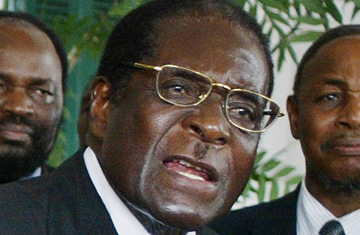
Zimbabwean President Robert Mugabe talks to journalists at the state house in Harare.
That might describe much of the country these days. Seven years after the white commercial farmers were driven from their estates by groups claiming to be veterans from Zimbabwe's 1970s guerrilla war against white minority rule, the economy is in free fall. The government estimates the annual inflation rate at 1,700%, but Western economists believe the real figure is closer to 3,500%, and rising fast. For the average citizen, that would mean that a can of coffee today would cost about four times the price paid last week. Today's morning bus ride to work might cost about double tomorrow — that's if the bus company can find enough gas to fill the tank, and the cash with which to buy it. Harare stores now post prices in U.S. dollars, to save their staff the hours of work involved in calculating prices in Zimbabwe dollars that change daily.
Embassy staff in Harare technically break the law when buying pens and paper, because they pay in U.S. dollars. Officially, a greenback is worth 251 Zimbabwe dollars. But on the street, a U.S. dollar fetches about 18,000 Zimbabwe dollars: about the price of a quarter-gallon of gas. Government ministers and ranking officials still buy U.S. dollars on the official market, however, allowing them to resell the cash immediately at a 7,200% profit.
Amid all these signs of economic collapse, the question is: How does Zimbabwe survive? "It's a mystery to me sometimes," says a Western diplomat in Harare. "I would have said it should have collapsed already."
The answer may lie outside Zimbabwe's borders: Despite international outrage at Mugabe's gloves-off crackdown on the opposition, South Africa and China have played a key role in staving off the country's total collapse. South Africa's president Thabo Mbeki has refused to criticize Mugabe, with whom he shares an affinity, since both men fought for decades against a white government. As Western leaders increasingly favor the opposition Movement for Democratic Change, the South African government views the MDC as a Western-oriented political organization. And with more than a million Zimbabweans already in South Africa — where they are viewed by both officials and regular citizens as boosting the raging crime rate — Mbeki fears that further chaos could send hundreds of thousands more refugees flooding across the border.
Nor is Mugabe's demise guaranteed to bring stability to Zimbabwe. "We should not pretend to ourselves that there cannot be a worse leader in Zimbabwe," says Thomas Cargill, African program manager at the London think-tank Chatham House. Those factors have prompted Mbeki to help sustain his Zimbabwean counterpart's 27-year rule. South Africa supplies about 42% of Zimbabwe's electricity, at low cost. Mbeki has also offered Zimbabwe favorable financial loans, partly in order to avoid Zimbabwe's expulsion from the International Monetary Fund, to which it owes about $120 million.
Zimbabwe has rich deposits of strategic minerals, including platinum, nickel and copper, which are sold on world markets, and South African companies dominate Zimbabwe's mining industry.
China, which supported Mugabe's guerrilla movement during the liberation war of the 1970s, has more recently become a key customer as it hunts for minerals to fuel its booming economy. Mugabe, equally desperate for friends, recently introduced a "Look East" policy, seeking closer trade links with Asia. The strategy comes with huge benefits, particularly since the U.S. and European Union have barred government officials from traveling to the West. In 2005, barter agreements saw about $240 million worth of Zimbabwean gold and tobacco exported to China, in exchange for Chinese fighter jets and troop carriers. Even as opposition activists and police clashed on the streets last weekend, Harare's main newspaper, The Herald, trumpeted the visit to Beijing by 50 Zimbabwean businesswomen. Earlier this month, China's ambassador to Zimbabwe, Yuan Nansheng, estimated that trade with Zimbabwe would rise to about $500 million next year, nearly double the figure from 2005.
Even the Chinese trade lifeline would not be enough to prevent Zimbabwe's implosion were it not for the huge exodus of Zimbabweans, mostly to South Africa, in search of money to feed their families. "What is keeping most Zimbabweans from starving are the 3 million Zimbabweans outside the country now," says Stephen Chan, professor of international relations at the University of London's School of Oriental and African Studies. There are no reliable figures for remittances sent home by Zimbabweans living abroad, says Chan, because "most people try to smuggle in the money rather than sending it at the official rate."
Few economists familiar with Zimbabwe would have predicted a decade ago that the country would now be surviving on barter and smuggled banknotes. Zimbabwe's fertile soil made it a major exporter in the region of food and tobacco through the 1980s and 1990s. And decades of high-quality schooling had produced a large population of well-educated Zimbabweans who spoke good English, the language of the world economy. "That is the real tragedy: It has fallen a long way," says Michael Baxter, the country representative for Zimbabwe for the World Bank, which currently loans the country no money because of unpaid debts of more than $920 million.
Emerging from long-running civil wars long after Zimbabwe, nearby Angola is now a key oil producer, while neighboring Mozambique's white-powder beaches attract thousands of Western tourists. By contrast, it could take years still for Zimbabwe to recover, says Baxter, and then only with extensive help from the World Bank and IMF. "We don't know how long it will be before we can reengage," he says. Until then the embassies in Harare will continue buying their office supplies with U.S. dollars.
